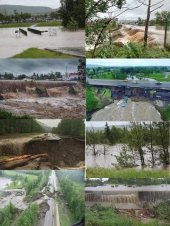
 1
1




Jay Angler wrote:
I have read that animals are incredibly good at getting to safety if you let them free to do so. You might not get them back after, but at least they'd have a fighting chance if there is an unexpected immediate evacuation order.Donna Lynn wrote: But with turkeys and chickens who are not easy to catch during daylight; and dogs and new cats who don't all get along well together yet, we really don't have a good current plan to evacuate all of us quickly and safely.
My Muscovy ducks only get access to chicken feed at bedtime. Food is a great motivator for them. It wouldn't be exactly easy to corral them at an unexpected time, but if you can find something the chickens and turkeys consider a "treat" and mostly save it for emergencies, that would qualify as "preparedness"! You still would require sufficient portable infrastructure to actually evacuate them. We have a lot of dog crates we've mostly been given, but I still don't think there's enough of them to seriously evacuate all our animals. This is certainly something we need to ponder.

 3
3




Visit Redhawk's soil series: https://permies.com/wiki/redhawk-soil
How permies.com works: https://permies.com/wiki/34193/permies-works-links-threads
 7
7




"When the whole world is running towards a cliff, he who is running in the opposite direction appears to have lost his mind." C.S. Lewis
Visit https://themaineingredient.com for organic, premium dried culinary herbs that are grown, processed, and packaged in the USA.
 3
3




Matt McSpadden wrote:Sudden emergencies can be scary. House fire, hurricane, blizzard, heart attack. We have some good ideas listed here to be prepared.
One big thing is simply to think about it ahead of time when things are not crazy and scary. I know we don't like to think about bad or scary things, but fear is greater in the unknown. Some families don't talk about what to do in a fire because they don't want to scare the kids. But it is a fact that running through a scenario in your head can make it less scary and easier to deal with if you come across the real thing. They suggest running a drill for your kids so they have gone through the process. Some people suggest shutting the power off on a saturday night... figure out what you miss, and start making plans to have backups or alternatives to those things you miss.
Thank you in advance to everyone for their replies, help, and suggestions! Forgive me if I miss any replies, I'm still learning how to keep up with threads I participate in!




I like this model of composting toilet. It looks like the incinerator type. Can you tell us who makes this one Kaarina?Kaarina Kreus wrote:Flushing toilets with clean water and pumping that to far-away plants is a pretty new phenomen. Modern outhouses and composting toilets are pretty awesome, especially if you have a garden. No smells and you get composted manure.

|
please buy my thing and then I'll have more money:
Established homestead property 4 sale east of Austin TX
https://permies.com/t/259023/Established-homestead-property-sale-east
|





